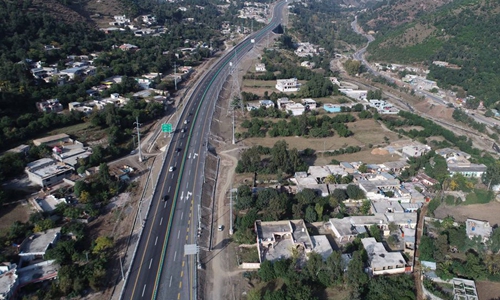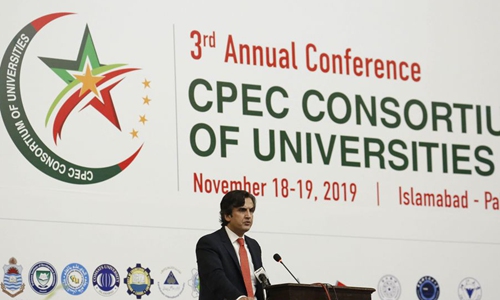How one US official got it wrong on China-Pakistan cooperation

Photo taken on Nov. 18, 2019 shows a view of the expressway section of the Karakorum Highway (KKH) project phase two in Pakistan. The expressway section of the KKH project phase two was inaugurated in Havelian in northwestern Pakistan on Monday, marking another step forward to complete the early harvest project under the China-Pakistan Economic Corridor (CPEC). (Xinhua/Liu Tian)
Alice Wells, a US State Department official for South and Central Asia, claimed Thursday that Chinese infrastructure projects in Pakistan would damage the latter's economy over the long term and solely benefit China.
The accusations were made apparently out of a habit by some US politicians to muddy waters, with an ulterior motive this time to drive a wedge between the two neighboring countries.
Facts tell how Wells, the principal deputy assistant secretary for the Bureau of South and Central Asian Affairs, got it wrong. She willfully ignored the win-win nature of the cooperation and turned a blind eye to the households across Pakistan illuminated under the projects.
The China-Pakistan Economic Corridor (CPEC) is now in its sixth year and has been broadly accepted by the Pakistani public as a model for promoting win-win cooperation that can help boost the South Asian country's economy, something that Wells has purposely turned back on.
The Pakistani leadership has reiterated on several occasions that CPEC bolsters Pakistan's development. Prime Minister Imran Khan recently vowed to ensure that CPEC remains his government's priority and called for more joint investment under the mega project.

Pakistan's Federal Minister for Planning, Development and Reforms Makhdoom Khusro Bakhtiar addresses the annual conference of the China-Pakistan Economic Corridor (CPEC) Consortium of Universities in Islamabad, capital of Pakistan, Nov. 18, 2019. (Xinhua/Ahmad Kamal)
In the past six years, energy projects completed under the CPEC have contributed to around 30 percent of Pakistan's total electricity generation, illuminating millions of local households and fueling the country's industrial growth.
Power plants under the CPEC also provide electricity at the lowest price among all 131 thermal power plants in Pakistan, according to the latest electricity purchase data released by Pakistan's National Transmission & Despatch Company Ltd.
Transportation infrastructure has also brought convenience to local residents and businesses and cut travel time between major cities by half.
In Gwadar, the restoration of the port and the newly-built free trade zone have attracted over 600 million US dollars of investment from over 20 Chinese and Pakistani enterprises.
On employment, CPEC has directly created more than 75,000 local jobs and involved over 100 Pakistani small- and medium-sized enterprises in the past six years. The Pakistani government estimated that CPEC will create 2.3 million jobs from 2015 to 2030, which is in line with Pakistan's economic agenda.
Wells was right about one thing -- CPEC is not about aid. It is a joint venture by the Chinese and Pakistani governments, people and enterprises based on the principles of extensive consultation, joint contribution and shared benefits.

Representatives from China and Pakistan sign cooperation documents during the ninth Joint Cooperation Committee (JCC) meeting of the China-Pakistan Economic Corridor (CPEC) in Islamabad, Pakistan, Nov. 5, 2019. (Xinhua/Ahmad Kamal)
The CPEC Joint Cooperation Committee clearly explains that from planning to execution, every step of a specific project is agreed upon by the two sides.
Furthermore, the CPEC is an inclusive project seeking shared prosperity, not a selfish one prioritizing a certain country. Both China and Pakistan have agreed to usher in a third party under the framework to achieve shared development.
If Washington truly wants to help with Pakistan's social and economic development, it should offer real help, at least stop badmouthing others' goodwill endeavors.